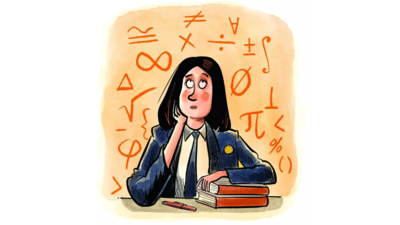ARTICLE AD BOX

When the University Grants Commission (UGC) unveiled its draft curriculum for undergraduate mathematics this August, it was presented as an ambitious alignment with the National Education Policy (NEP) 2020.
The proposal sought to weave together classical mathematical traditions, modern pedagogy, and interdisciplinary courses, even drawing on sources like the 'Narada Purana' and 'Bharatiya Bijaganit'.
But what was envisioned as a bold reform has instead triggered an extraordinary backlash from the country’s mathematics community.Over 900 mathematicians, educators, and researchers, among them 20 Padma awardees and several recipients of the Shanti Swarup Bhatnagar Prize, have signed a petition urging the withdrawal of the draft in its current form.
Flagging “grave defects,” they have warned that the proposed curriculum risks weakening not only the study of mathematics, but also every field that relies on it, from science and engineering to economics.
A curriculum steeped in heritage
At the heart of the draft are inclusions intended to foreground India’s rich mathematical tradition. Students would be taught the history and evolution of Indian algebra, the application of classical formulas such as Paravartya Yojayet Sutra for polynomial division, and even ritual timekeeping systems like muhurtas compared with the Greenwich Mean Time.
References to the Narada Purana’s geometry, Vedic mathematics, and ideas from ancient Indian astronomy are interwoven into the syllabus.The vision, UGC noted, was to create a curriculum that is both contemporary and rooted in heritage. Yet it is precisely this mixture, and the omissions that accompany it — that critics argue renders the draft unfit for purpose.
The petitioners’ case
In a strongly worded statement sent to UGC Chairperson Vineet Joshi on Thursday, the petitioners urged that the draft be scrapped and redrawn by a committee of qualified mathematicians and educators.
They contend that the current document marginalises foundational subjects while privileging outdated or irrelevant inclusions.Among their chief objections:
- Core subjects such as real analysis, linear algebra, and modern algebra are either inadequately covered or crammed into single semesters, leaving no scope for natural progression.
- Applied mathematics has been sidelined, with programming and numerical methods excluded from the core. Statistics has been reduced to a single course with no practical training, undermining opportunities for application in fields such as machine learning or artificial intelligence.
- Elective courses are poorly structured. For instance, “Mathematics in Music” claims to require only Class 10 knowledge but includes topics like Fourier analysis and Markov chains, while “Mathematics in Machine Learning” attempts to cover advanced concepts in just 15 hours.
- Several interdisciplinary courses stray far beyond the expertise of most mathematics teachers. Courses linking mathematics to meditation, drama, or arts, the signatories argue, are inappropriate for an undergraduate program.
The petition further points to the presence of outdated courses such as Analytical Geometry and Mechanics, labelled remnants of colonial-era syllabi, and highlights the bizarre citation of reference materials that do not exist. Books attributed to authors such as Rudin, Glenn Ledder, and Mirabai Starr in course bibliographies, for example, cannot be located.
What is at stake
According to the signatories, these defects will not only undermine the mathematical training of students but will also “cripple” generations to come by diluting research and industry standards. “Applied mathematics is short-changed; programming and numerical methods are outside the core. Statistics is stuffed into one course. In courses on statistics, machine learning, artificial intelligence etc. it is natural and customary to have a practical and application-based component; this opportunity has been squandered,” the petition notes.The academics caution that the ripple effects will extend well beyond the classroom — affecting science, technology, and the nation’s broader capacity for innovation.
A call for redrafting
India, they stress, has no shortage of globally recognised mathematicians and educators who could help create a balanced, relevant curriculum. Eminent scholars have emphasised that UGC must tap into this expertise.“A nation with such a rich heritage of performing well in mathematics should have a curriculum that equips its students to meet the demands of the contemporary world,” the petition declares.
The single recommendation, delivered with striking unanimity, is clear: withdraw the current draft and reconstitute a committee of experts in mathematics and pedagogy to design a curriculum that is rigorous, practical, and future-ready.As one of the most sweeping challenges ever mounted against a UGC curriculum draft, the petition underlines what is truly at stake: the future of mathematics education, and with it, the foundations of scientific endeavour in India. But for now, this is only a draft. How the UGC responds, whether through revision, withdrawal or quiet persistence, will decide if the criticism sparks change or fades into yet another academic debate.(with PTI inputs)



.png)
.png)
.png)
















 1 hour ago
4
1 hour ago
4









 English (US) ·
English (US) ·